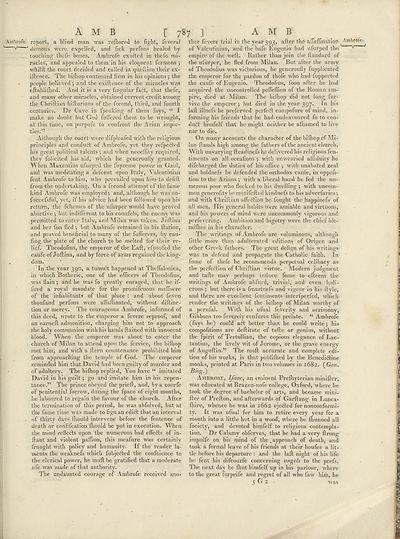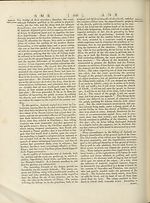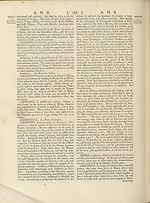Encyclopaedia Britannica, or, a Dictionary of arts, sciences, and miscellaneous literature : enlarged and improved. Illustrated with nearly six hundred engravings > Volume 1, A-AME
(839) Page 787
Download files
Complete book:
Individual page:
Thumbnail gallery: Grid view | List view

A M B C 787 ] A M B
Anibrofe. report, a blind man was reftored to figbt, feveral
; demons were expelled, and lick perfons healed by
touching tbel'e bones. Ambrofe exulted in thefe. mi¬
racles, and appealed to them in his eloquent fermons ;
whilft the court derided and called in quetlion their ex-
illence. The bifhop continued firm in his opinions 5 the
people believed ", and the exillence of the miracles was
eftablifhed. And it is a very lingular fad, that thefe,
and many other miracles, obtained current credit among
the Chi’ittian hiftorians of the fecond, third, and fourth
centuries. Dr Cave in fpeaking of them fays, “ I
make no doubt but God fuffered them to be wrought,
at this time, on purpofe to confront the Arian impie-
ties.”
Although the court were difpleafed with the religious
principles and con dud of Ambrofe, yet they refpected
his great political talents ; and when necellity required,
they folicited his aid, which he generoully granted.
When Maxentius ufurped the fupreme power in Gaul,
and was meditating a defcent upon Italy, Yalentinian
fent Ambrofe to him, who prevailed upon him to deliil
from the undertaking. On a fecond attempt of the fame
kind Ambrofe was employed; and, although he was un-
fuccefsful, yet, if his advice had been followed upon bis
return, the fchemes of the ufurper would have proved
abortive ; but indifferent to his counfels, the enemy was
permitted to enter Italy, and Milan was taken. Jultina
and her fon fled ; but Ambrofe remained in his ftation,
and proved beneficial to many of the fufferers, by cau-
fing the plate of the church to be melted for their re¬
lief. Theodofius, the emperor of the Eaft, efpoufed the
caufe of Juftina, and by force of arms regained the king-
_ dom.
In the year 390, a tumult happened at Theffalonica,
in which Botheric, one of the officers of Theodofius,
was llain ; and he was fo greatly enraged, that he if-
fued a royal mandate for the promifeuous maffacre
of the inhabitants of that place : and about feven
thoufand perfons were affaffinated, without diftinc-
tion or mercy. The courageous Ambrofe, informed of
this deed, wrote to the emperor a fevere reproof, and
an earneft admonition, charging him not to approach
the holy communion with his hands llained with innocent
blood. When the emperor was about to enter the
church of Milan to attend upon the fervice, the bifhop
met him, and with a flern countenance prohibited him
from approaching the temple of God. The emperor
reminded him that David bad been guilty of murder and
> of adultery. The biffiop replied, You have “ imitated
David in his guilt ; go and imitate him in his repen¬
tance.” The prince obeyed the prieft, and, by a courfe
of penitential borrow, during the fpace of eight months,
he laboured to regain the favour of the church. After
the termination of this period, he was abfolved, but at
the fame time was made to fign an edidl that an interval
of thirty days ffiould intervene before the fentence of
death or confifcation fliould be put in execution. When
the mind refledls upon the numerous bad effedls of in-
ilant and violent paffion, this meafure was certainly
fraught with policy and humanity. If the reader la¬
ments the weaknefs which fubjedled the confcience to
the clerical power, he mull be gratified that a moderate
ufe was made of that authority.
The undaunted courage of Ambrofe received ano¬
ther fevere trial in the year 393, after the affaffination
of Valentinian, and the bafe Eugenio had ufurped the
empire of the welt. Bather than join the llandard of
the ufurper, he fled from Milan. But after the army
of Theodofius was victorious, he generoully fupplicated
the emperor for the pardon of thofe who had lupported
the caufe of Eugenio. Theodofius, foon after he had
acquired the uncontrolled poll'effion of the Roman em¬
pire, died at Milan. The hilhop did not long fur-
vive the emperor; but died in the year 397- In his
lait illnefs he preferved perfect compofure of mind, in¬
forming his friends that he had-endeavoured fo to con-
dudt himfelf that he might neither be alhamed to live
nor to die.
On many accounts the chara6ter of the bifliop of Mi¬
lan Hands high among the fathers of the ancient church.
With unvarying lleadinefs he delivered his religious fen-
timents on all occafions ; with unwearied alliduity he
difeharged the duties of his office ; with unabated zeal
and boldnefs he defended the orthodox caufe, in oppofi-
tion to the Arians ; with a liberal hand he fed the nu¬
merous poor who flocked to his dwelling ; with uncom¬
mon generofity hemanifelled kindnefsto his adverfaries;
and with Chriftian affection he fought the happinefs of
all men. His general habits were amiable and virtuous,
and his powers of mind were uncommonly vigorous and
perfevering. Ambition and bigotry were the chief ble-
miflies in his character.
The writings of Ambrofe are voluminous, although
little more than adulterated editions of Origen and
other Greek fathers. The great defign of his writings
was to defend and propagate the Catholic faith. In
fome of thefe he recommends perpetual celibacy as
the perfedtion of Chriftian virtue. Modern judgment
and tafte may perhaps induce fome to efteem the
writings of Ambrofe abfurd, trivial, and even ludi¬
crous ; but there is a fmartnefs and vigour in his ftyle,
and there are excellent fentiments interfperfed, which
render the writings of the hiffiop of Milan worthy of
a perufal. With his ufual feverity and acrimony,
Gibbons too feverely cenfures this prelate. “ Ambrofe
(fays he) could adt better than he could write; his
compofitions are deftitute of tafte or genius, without
the fpirit of Tertullian, the copious elegance of Lac-
tantius, the lively wit of Jerome, or the grave energy
of Auguftin.” The moft accurate and complete edi¬
tion of his works, is that publifhed hy the Benedidtine
monks, printed at Paids in two volumes in 1682. (Gc«.
Biog.)
Ambrose, Ifaac, an eminent Prefbyterian miniftcr,
was educated at Brazen-nofe college, Oxford, where he
took the degree of bachelor of arts, and became mini-
fter of Prefton, and afterwards of Garftang in Lanca-
fhire, whence he was in 1662 ejedted for nonconformi¬
ty. It was ufual for him to retire every year for a
month into a little hut in a wood, where he munned all
iociety, and devoted himfelf to religious contempla¬
tion. Dr Calamy obferves, that he had a very ftrong
impulfe on his mind of the .approach of death, and
took a formal leave of his friends at their houfes a lit¬
tle before his departure : and the laft night of his life
he fent his difeourfe concerning angels to the prefs.
The next day he fhut himfelf up in his parlour, where
to the great furprife and regret of all who faw him, he
5 G 2 - was
Ambrofe.
Anibrofe. report, a blind man was reftored to figbt, feveral
; demons were expelled, and lick perfons healed by
touching tbel'e bones. Ambrofe exulted in thefe. mi¬
racles, and appealed to them in his eloquent fermons ;
whilft the court derided and called in quetlion their ex-
illence. The bifhop continued firm in his opinions 5 the
people believed ", and the exillence of the miracles was
eftablifhed. And it is a very lingular fad, that thefe,
and many other miracles, obtained current credit among
the Chi’ittian hiftorians of the fecond, third, and fourth
centuries. Dr Cave in fpeaking of them fays, “ I
make no doubt but God fuffered them to be wrought,
at this time, on purpofe to confront the Arian impie-
ties.”
Although the court were difpleafed with the religious
principles and con dud of Ambrofe, yet they refpected
his great political talents ; and when necellity required,
they folicited his aid, which he generoully granted.
When Maxentius ufurped the fupreme power in Gaul,
and was meditating a defcent upon Italy, Yalentinian
fent Ambrofe to him, who prevailed upon him to deliil
from the undertaking. On a fecond attempt of the fame
kind Ambrofe was employed; and, although he was un-
fuccefsful, yet, if his advice had been followed upon bis
return, the fchemes of the ufurper would have proved
abortive ; but indifferent to his counfels, the enemy was
permitted to enter Italy, and Milan was taken. Jultina
and her fon fled ; but Ambrofe remained in his ftation,
and proved beneficial to many of the fufferers, by cau-
fing the plate of the church to be melted for their re¬
lief. Theodofius, the emperor of the Eaft, efpoufed the
caufe of Juftina, and by force of arms regained the king-
_ dom.
In the year 390, a tumult happened at Theffalonica,
in which Botheric, one of the officers of Theodofius,
was llain ; and he was fo greatly enraged, that he if-
fued a royal mandate for the promifeuous maffacre
of the inhabitants of that place : and about feven
thoufand perfons were affaffinated, without diftinc-
tion or mercy. The courageous Ambrofe, informed of
this deed, wrote to the emperor a fevere reproof, and
an earneft admonition, charging him not to approach
the holy communion with his hands llained with innocent
blood. When the emperor was about to enter the
church of Milan to attend upon the fervice, the bifhop
met him, and with a flern countenance prohibited him
from approaching the temple of God. The emperor
reminded him that David bad been guilty of murder and
> of adultery. The biffiop replied, You have “ imitated
David in his guilt ; go and imitate him in his repen¬
tance.” The prince obeyed the prieft, and, by a courfe
of penitential borrow, during the fpace of eight months,
he laboured to regain the favour of the church. After
the termination of this period, he was abfolved, but at
the fame time was made to fign an edidl that an interval
of thirty days ffiould intervene before the fentence of
death or confifcation fliould be put in execution. When
the mind refledls upon the numerous bad effedls of in-
ilant and violent paffion, this meafure was certainly
fraught with policy and humanity. If the reader la¬
ments the weaknefs which fubjedled the confcience to
the clerical power, he mull be gratified that a moderate
ufe was made of that authority.
The undaunted courage of Ambrofe received ano¬
ther fevere trial in the year 393, after the affaffination
of Valentinian, and the bafe Eugenio had ufurped the
empire of the welt. Bather than join the llandard of
the ufurper, he fled from Milan. But after the army
of Theodofius was victorious, he generoully fupplicated
the emperor for the pardon of thofe who had lupported
the caufe of Eugenio. Theodofius, foon after he had
acquired the uncontrolled poll'effion of the Roman em¬
pire, died at Milan. The hilhop did not long fur-
vive the emperor; but died in the year 397- In his
lait illnefs he preferved perfect compofure of mind, in¬
forming his friends that he had-endeavoured fo to con-
dudt himfelf that he might neither be alhamed to live
nor to die.
On many accounts the chara6ter of the bifliop of Mi¬
lan Hands high among the fathers of the ancient church.
With unvarying lleadinefs he delivered his religious fen-
timents on all occafions ; with unwearied alliduity he
difeharged the duties of his office ; with unabated zeal
and boldnefs he defended the orthodox caufe, in oppofi-
tion to the Arians ; with a liberal hand he fed the nu¬
merous poor who flocked to his dwelling ; with uncom¬
mon generofity hemanifelled kindnefsto his adverfaries;
and with Chriftian affection he fought the happinefs of
all men. His general habits were amiable and virtuous,
and his powers of mind were uncommonly vigorous and
perfevering. Ambition and bigotry were the chief ble-
miflies in his character.
The writings of Ambrofe are voluminous, although
little more than adulterated editions of Origen and
other Greek fathers. The great defign of his writings
was to defend and propagate the Catholic faith. In
fome of thefe he recommends perpetual celibacy as
the perfedtion of Chriftian virtue. Modern judgment
and tafte may perhaps induce fome to efteem the
writings of Ambrofe abfurd, trivial, and even ludi¬
crous ; but there is a fmartnefs and vigour in his ftyle,
and there are excellent fentiments interfperfed, which
render the writings of the hiffiop of Milan worthy of
a perufal. With his ufual feverity and acrimony,
Gibbons too feverely cenfures this prelate. “ Ambrofe
(fays he) could adt better than he could write; his
compofitions are deftitute of tafte or genius, without
the fpirit of Tertullian, the copious elegance of Lac-
tantius, the lively wit of Jerome, or the grave energy
of Auguftin.” The moft accurate and complete edi¬
tion of his works, is that publifhed hy the Benedidtine
monks, printed at Paids in two volumes in 1682. (Gc«.
Biog.)
Ambrose, Ifaac, an eminent Prefbyterian miniftcr,
was educated at Brazen-nofe college, Oxford, where he
took the degree of bachelor of arts, and became mini-
fter of Prefton, and afterwards of Garftang in Lanca-
fhire, whence he was in 1662 ejedted for nonconformi¬
ty. It was ufual for him to retire every year for a
month into a little hut in a wood, where he munned all
iociety, and devoted himfelf to religious contempla¬
tion. Dr Calamy obferves, that he had a very ftrong
impulfe on his mind of the .approach of death, and
took a formal leave of his friends at their houfes a lit¬
tle before his departure : and the laft night of his life
he fent his difeourfe concerning angels to the prefs.
The next day he fhut himfelf up in his parlour, where
to the great furprife and regret of all who faw him, he
5 G 2 - was
Ambrofe.
Set display mode to:
![]() Universal Viewer |
Universal Viewer | ![]() Mirador |
Large image | Transcription
Mirador |
Large image | Transcription
Images and transcriptions on this page, including medium image downloads, may be used under the Creative Commons Attribution 4.0 International Licence unless otherwise stated. ![]()
| Permanent URL | https://digital.nls.uk/193142892 |
|---|
| Attribution and copyright: |
|
|---|
| Description | Ten editions of 'Encyclopaedia Britannica', issued from 1768-1903, in 231 volumes. Originally issued in 100 weekly parts (3 volumes) between 1768 and 1771 by publishers: Colin Macfarquhar and Andrew Bell (Edinburgh); editor: William Smellie: engraver: Andrew Bell. Expanded editions in the 19th century featured more volumes and contributions from leading experts in their fields. Managed and published in Edinburgh up to the 9th edition (25 volumes, from 1875-1889); the 10th edition (1902-1903) re-issued the 9th edition, with 11 supplementary volumes. |
|---|---|
| Additional NLS resources: |
|

